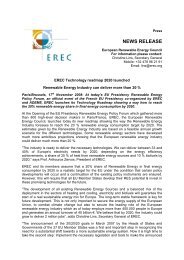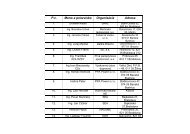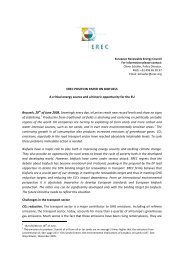CTO Assessment - European Commission
CTO Assessment - European Commission
CTO Assessment - European Commission
You also want an ePaper? Increase the reach of your titles
YUMPU automatically turns print PDFs into web optimized ePapers that Google loves.
Achievements<br />
and Lessons<br />
drawn from the <strong>CTO</strong><br />
Experience accumulated during the<br />
Campaign has to be analysed under<br />
two criteria. Firstly by comparing<br />
results with the objectives outlined,<br />
in particular those regarding RES<br />
coverage, RES market development<br />
and technological capability, without<br />
forgetting aspects related with innovation<br />
in all its dimensions, a constant<br />
feature of <strong>CTO</strong>. Secondly, <strong>CTO</strong><br />
allowed exploring new dimensions in<br />
the framework of an integrated view<br />
for the development of renewables in<br />
Europe. Therefore, lessons that can<br />
be extracted also involve other dimensions<br />
dealing with the role and<br />
promotion of renewables, with regard<br />
to their social, economic, and environmental<br />
sides.<br />
The analysis of the initiatives demonstrated<br />
in general that the local<br />
communities benefit from promoting<br />
and developing the market penetration<br />
of RES. Several Community priorities<br />
and concerns such as environment,<br />
job creation, local and regional<br />
development for a strong economic<br />
and social cohesion have been positively<br />
influenced by it. As well, the<br />
main energy policy issues such as the<br />
security of supply, the improvement<br />
of the energy balance and the reduction<br />
of energy dependency, the environmental<br />
implications of energy production<br />
and use and competitiveness<br />
have benefited from the uptake of<br />
RES.<br />
Starting from an in-depth analysis,<br />
main successes and barriers in relation<br />
with <strong>CTO</strong> objectives are shown,<br />
grouped into lines of action and most<br />
important factors, and glossing these<br />
conclusions with the relevant references<br />
of the cases selected.<br />
Objectives in key sectors<br />
As we could observe in the chapter<br />
addressing market analysis for each<br />
of the three renewable energy sectors,<br />
the degree of accomplishment of the<br />
initiative’s objectives has been variable<br />
in each of these areas, with outstanding<br />
results recorded in most of<br />
the initiatives, including wind energy,<br />
and several spectacular actions in the<br />
implementation of solar thermal in<br />
some geographic regions that exceeded<br />
the initial objectives.<br />
With regard to the objectives outlined<br />
in each initiative, we can conclude<br />
that the most decisive factors for success<br />
have been:<br />
Project supported through a solid<br />
technological proposal and with a<br />
good feasibility analysis.<br />
High degree of cooperation and integration<br />
of the several actors involved<br />
in each initiative.<br />
High public acceptation of the initiatives.<br />
On the contrary some problems have<br />
been detected in those initiatives depending<br />
on unfavourable factors such<br />
as:<br />
Starting from little realistic or<br />
unachievable objectives.<br />
Conflicts in the implementation of<br />
unripe technological solutions.<br />
Existence of adverse market conditions<br />
or scarce confidence in investments.<br />
Low technical skill.<br />
Loss of the political support guaranteed<br />
at the starting moment.<br />
Economic changes or crisis at local<br />
or regional level.<br />
Achievements and lessons<br />
27




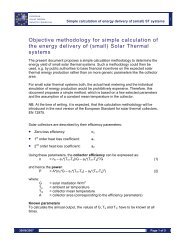


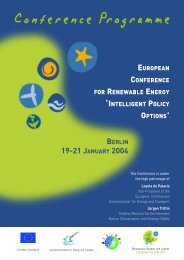
![Energy [R]evolution - Greenpeace](https://img.yumpu.com/47174859/1/184x260/energy-revolution-greenpeace.jpg?quality=85)
